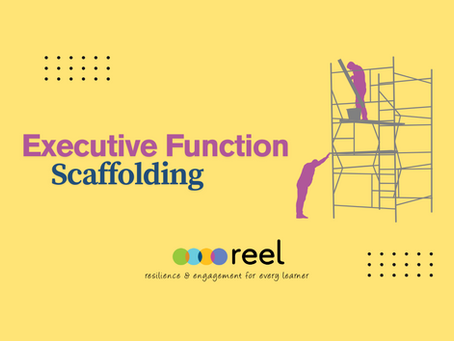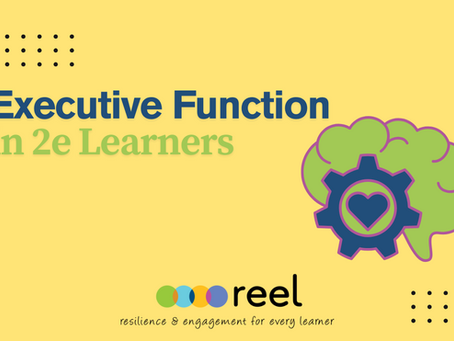top of page

GETTING REEL


Understanding Motivation and Burnout in 2e and Neurodivergent Learners with Dr. Megan Anna Neff
This discussion featured Dr. Megan Anna Neff, a licensed clinical psychologist, who explored the complex relationship between motivation, burnout, and neurodivergence in twice-exceptional (2E) learners. The discussion provided a deep dive into how ADHD, autism, and giftedness uniquely impact a student's ability to engage with tasks and move toward their goals.
Jan 23


Autism and PDA
Our May 2025 support group for parenting 2e kids, Tarra Knotts discusses the traits and experiences of students with PDA (Pathological Demand Avoidance). Read the transcript here I think I ran into real to eat before I ran into parents helping parents. But anyway, I've been running the PDA, pathological demand avoidance or pervasive drive for autonomy parent group with parents helping parents. Originally it started in real 2 and then we moved it over to parent helping parents
Jul 29, 2025


Organizing for Back to School for 2e / Neurodivergent Learners
At the July 2025 PHP REEL Support Group, Leisa, a 2e/neurodivergent parent and professional from Calm in Chaos Co who specializes in organizing spaces for neurodivergent brains and lifestyles, spoke about organizing for back to school. She follows a “strengths-based” philosophy. "What strengths do I have and how can I use my strengths and awareness of struggles to organize our spaces to work for us?" She offered great tips like, “take sensory sensitivity into consideration w
Jul 22, 2025


Executive Function Scaffolding
In this video, we explore the concept of scaffolding through the worksheet Can We Figure Out a Different Way?—a tool designed to support neurodivergent learners by focusing on accessibility, not ability. Learn how to scaffold tasks in a way that aligns with your child’s strengths and unique neurodivergent profile.
Jul 14, 2025


Executive Function in 2e Learners
Parents of twice-exceptional (gifted + learning differences) kids face challenges with executive function (EF) skills, which develop slower in neurodivergent children. Tools like the EF Vocabulary Cheat Sheet and Strengths & EF Struggles Map help families identify challenges and strengths. Involving kids in these exercises builds self-awareness and support strategies.
Jul 13, 2025


Strength Based Scaffolding for Executive Function Skills
This is an example from our facilitated small group discussions. It is meant to help parents realize they are probably already scaffolding in some areas and how tailoring scaffolding to their child's strengths could be more helpful in finding the best way to scaffold their child.
Jul 13, 2025


Supporting Executive Functioning at Home and in School: A 2e Perspective
Learn how to support executive functioning in twice-exceptional (2e) learners with expert Rachel Kapp. This online talk offers practical strategies, tailored tools, and school advocacy tips to help 2e students thrive by leveraging their strengths and understanding their unique learning profiles.
May 6, 2025


The DEAR REEL Model: Developing Connections
Our DEAR REEL model is based on academic research and best practices from experienced educators about what works for these learners. The DEAR REEL model consists of four lenses: Develop Connection, Embrace Flexibility, Attend to Strengths and Reframe Behaviors. This video discusses the portion regarding developing connections.
Apr 29, 2025


Neurodiversity Celebration Week Student Panel 2025
We will discuss how students' strengths helped them overcome challenges, what schools and parents can do to best support K-12 2e learners, and hear advice for students who are struggling.
Mar 15, 2025


2025 REEL Strengths Fair "Neurodivergent and Strong: Developing Our Superpowers"
Sam Young of Young Scholars Academy talks about focusing on the strengths of the child to develop positive learning outcomes.
Mar 14, 2025


2025 REEL Strengths Fair, How to build a "can’t help but thrive" task management system w/ Sam Young
In this recording from the 2025 REEL Strengths Fair, Sam Young discusses ways to help your student plan and organize. Link to resource at the end: https://youngscholarsacademy.org/courses/self-paced/demo-optin
Mar 14, 2025


2025 REEL Strengths Fair "Neurodiversity Unleashed: Turning Dyslexic Traits into Tools for Success"
Gil Gershoni of Dyslexic Thinking and Gershoni Creative discusses strengths of the dyslexic mind.
Mar 11, 2025


What is 2e and the DEAR REEL Model
The DEAR REEL Model equips educators with powerful strategies to transform the classroom experience, not just for 2e students, but for every learner. By focusing on strengths and addressing challenges with empathy and flexibility, we create a space where all students can fulfill their potential and thrive.
Jan 23, 2025


Navigating Anxiety in 2e Learners: Therapy Options and Home Strategies
Dr. Kari Berquist will discuss the SPACE program, Dr. Bradley Siu will introduce DBT (Dialectical Behavior Therapy), and Toni Ratzburg, LMFT, will share insights on integrative perspective therapy, , where therapists interweave different approaches based on the specific needs and personalities of the client.
Nov 13, 2024


VIDEO: THE DEAR REEL MODEL: Classroom Strategies for Twice-Exceptional Student Success
In this recording from Join REEL's executive director, Abby Kirigin, to discover new strategies and ideas for supporting twice-exceptional (2e) students at school using the DEAR REEL model. We developed the DEAR REEL model to provide a more concrete way to provide guidance on working with the 2e. The model is based on academic research and best practices from experienced educators about what works for these learners. The DEAR REEL model consists of four lenses: Develop Connec
Oct 28, 2024


Video: Integrating Neurodivergent Strengths at School
Understanding, honoring, and integrating the interest and strengths of 2e learners is paramount to their well-being, and yet so rarely considered in the educational context. How can parents work with their child's school to encourage strength-based approaches, whether that be in a teacher conference, the IEP process, or other conversations? Join us for this special Neurodiversity Celebration Week lunchtime meetup with Dr. Jade Rivera, Director of the Strength-Based Assessment
Mar 17, 2024


2e Emotional Regulation
Emily will break down the 4-step process of emotional regulation so we can help our kids who are "a little bit extra" find healthy ways to manage their emotions.
Feb 15, 2024


2e & Executive Functioning
in this talk our panelists focused on planning and prioritizing, task initiation, and organization. Experts Sam Young, Marcie Habell, and Mason Tudor provided tips on how to support your 2e student through a strength-based lens, including what accommodations to ask for at school as well as strategies for tackling tasks such as homework, note taking, project planning, task management, and goal setting.
Nov 15, 2023


VIDEO: 2e Math Solutions - Resources
how dyslexia, dysgraphia, working memory, and processing speed can impact performance in math.
Oct 26, 2023


What Can You Ask Your School For?
What is reasonable and likely to be accepted and what is not? Our panel of two parents and a neuropsychologist discussed and suggested concrete support and accommodation options as well as answered questions from our parent community.
Sep 18, 2023
bottom of page
